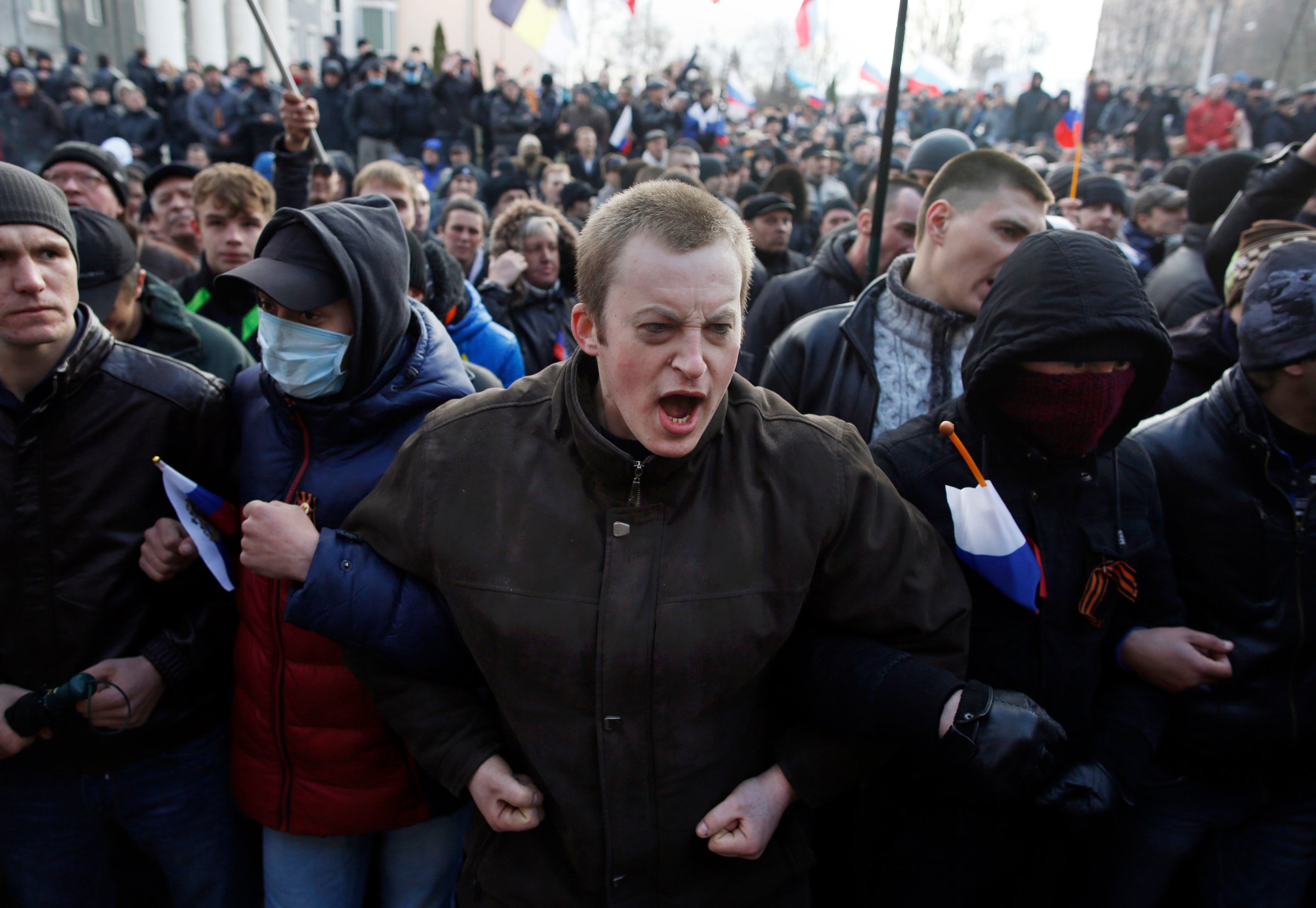
Ukraine is haunted by history. The most powerful ghosts tormenting its relationship with Russia are certainly those of the estimated 7 million who died in the genocidal famine unleashed against Ukrainian peasants by Stalin from 1932-33. And looming behind the counterclaims of fascism leveled by western-oriented Ukrainians and the separatists who have seized control of Crimea are, among others, the estimated 100,000 victims–most of them Jewish, many of them women, children and the elderly–who were killed at Babi Yar outside Kiev by the Nazis and their local collaborators in 1941.
But it seems even humanitarianism can haunt Ukraine. In 1999, then-President Bill Clinton launched a 78-day air war against Serb forces controlling the largely ethnic Albanian province of Serbia called Kosovo, in the former Yugoslavia. Clinton justified the intervention because he and his NATO allies suspected the Serbian leader Slobodan Milosevic was beginning a new round of genocidal ethnic cleansing like the one he had unleashed elsewhere in the former Yugoslavia eight years earlier. Russia, Serbia’s traditional ally, opposed the intervention, blocking any potential UN authorization of it. In hindsight, even the war’s supporters now admit it violated the UN charter and was illegal under international law.
Following Kosovo’s early-2008 declaration of independence, the United States formally recognized the province as a sovereign state. In an attempt to limit the example the war and Kosovo’s subsequent secession might set elsewhere, the State Department declared, “The United States considers Kosovo to be a special case that should not be seen as a precedent for other situations.”
Predictably enough, however, Russia is using the Kosovo war as a pretext for its annexation of Crimea. As Harvard’s inimitable Jack Goldsmith relates:
Russia is now invoking Kosovo—both the 1999 intervention, and Kosovo’s 2008 declaration of independence—in support of Crimea’s independence movement. Last week Russian Foreign Minister Sergey Lavrov proclaimed (at just before the 10-minute mark): ‘If Kosovo is a special case then Crimea is a special case; it’s just equally special.’
In fact, there is little moral equivalence between the two cases. Milosevic had unleashed the worst violence targeting an ethnic or religious group on the European continent since the Holocaust. In 1999 his forces were killing ethnic Albanians in Kosovo. And the NATO intervention was driven primarily by humanitarian concerns. All of which has led the West to declare that the war was “illegal but legitimate”.
By contrast, there is no recent history of anti-Russian genocidal violence in Ukraine. There is no credible evidence that ethnic Russians have been targeted by the government of Ukraine in the recent months of unrest there. And one only need review the public comments out of Moscow to see that Russia’s intervention is primarily strategic and nationalistic, not humanitarian.
Unfortunately, moral legitimacy doesn’t carry as much weight as it might in international affairs. And there are plenty of ancillary facts that Russian President Vladimir Putin and his government can use to muddy the waters.
For example, in an interesting 2008 debate with Jeremy Scahill, then of The Nation, the current U.S. Ambassador to the United Nations Samantha Power admitted with trademark frankness that in Kosovo the West was also partially driven by the strategic goal of bolstering NATO’s credibility, which was in question after its sluggish response to the wars in the Balkans and its ill-defined rationale for expansion. And while the West may point to the questionable backgrounds and legitimacy of the pro-Russian Crimeans who have taken power using dubious parliamentary procedures, many of the ethnic Albanians the U.S. backed in Kosovo were thugs—some were eventually charged and convicted of war crimes.
Now pro-Russian forces are unleashing mob-violence against Ukranians–one chilling report tells of a mob burning Ukranian language accounts of Stalin’s genocidal famine. With Russia using the Kosovo war as a pretext for its violation of Ukraine’s sovereignty, it is ironic that some who argued for the Kosovo intervention saw it as an opportunity to establish the international doctrine of humanitarian intervention (Power and current National Security Advisor Susan Rice were among the proponents of the idea, which also had the support of some neo-conservatives).
It is also ironic that the West’s strategic interest of bolstering NATO’s credibility through intervention in Kosovo may also be undermined by the events in Ukraine. In Washington it is hard to imagine the unrest in Ukraine could lead to a direct confrontation between NATO and Russia. But it may be much easier to imagine in one of the six NATO capitals that directly border Ukraine or Russia.
For those countries, the ghosts now haunting Ukraine raise another specter from the past: whether the West would abandon a treaty committing it to the defense of countries in central and eastern Europe in the face of a resurgent regional power. Fortunately, there seems to be little chance of NATO being put to that test now. But Putin’s moves in Crimea, and his use of Kosovo to justify them, certainly weaken NATO’s credibility. The long-suffering people of central and eastern Europe may well worry how many old ghosts Putin plans to raise, and whether he intends to add to them.
More Must-Reads from TIME
- Donald Trump Is TIME's 2024 Person of the Year
- Why We Chose Trump as Person of the Year
- Is Intermittent Fasting Good or Bad for You?
- The 100 Must-Read Books of 2024
- The 20 Best Christmas TV Episodes
- Column: If Optimism Feels Ridiculous Now, Try Hope
- The Future of Climate Action Is Trade Policy
- Merle Bombardieri Is Helping People Make the Baby Decision
Contact us at letters@time.com